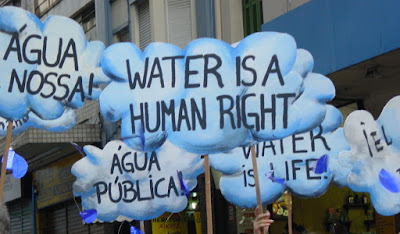Water supply: Yes or No to Privatisation?
In this week's blog from The Politics of Water, we'll be looking at the political policies regarding water supply ownership in Africa, and the debate between public and private.
Governance of water in Africa is important on lots of scales, from continent wide riparian water sources through to municipal local authorities. In the next couple of blogs, we'll look over the major issues of water governance between governments, companies and people. Successful water governance requires co-operation of all three stakeholders, but this week we are focusing upon companies and the private ownership of water supplies.
How can a company own a water supply?
This can occur in a number of ways, ranging in control and profitability for the company. Privatisation does not simply mean complete ownership and control of water supplies for a company, and can involve different levels of ownership and tenure for the water supplier (Chetty and Luiz 2014). Divesture is the longest term, which is pure privatisation - complete and permanent ownership over the water supply. There are also a number of differing length contracts awarded by the government which retain the ownership of the network, ranging from short term service contracts (1-2 years) up to Concession contracts of up to 30 years. Some of the contract types give ownership of the infrastructure to the corporation, but the billing still through a public company which pays a fixed fee to the company, where as others allow the corporation to set the price of water, but pay a fee to use the public water infrastructure for their network. The level of involvement of public and private in these PPPs (Public Private Partnerships) is very important to how the network is operated.
How is this a political issue?
There's several ways in which water privatisation impacts the politics of a country, but we will begin by looking at the argument covered by Bayliss (2003) regarding sociopolitical impacts of privatisation. When privatising a water supply, the government of the nation is relinquishing control of one of the primary resources of its people. Now, this not only impacts the government itself - having a reduced level of sovereignty and power, but can also impact the population, whose water supplier is now focused on serving shareholders rather than citizens. In the best cases, such as in Botswana (privatised 1970), privatisation creates a more efficient water system, increasing access to clean water for the population through better infrastructure and replacing inefficient and politically unpopular public water networks. Indeed this has been true for many of the private networks across Senegal, Namibia and Burkina Faso.
However, when privatisation is not effective, it can have catastrophic impacts. Price hikes to please investors and recoup infrastructure investment can drastically reduce the affordability of water in the country, leaving the poorest of the population either not paying for the water they use or turning to non billed and often dangerous water supplies. Other problems include networks being poorly maintained to minimise expenditure or as in the case of Lagos earlier this year, only being connected to wealthier regions where the billing rate was higher, leaving many poorer suburbs without a developed water system.
 |
| Protests in May 2018 to the PPP water supply scheme in Lagos, Nigeria. Source (Environmental Rights Action) |
Often the cause is what we will call over privatisation, where private companies controlling the water supply are given too much autonomy to control pricing and infrastructure, with no regulation to their tenure or practise. Many of the successful examples of privatisation in Africa, such as in Senegal with the Sde, have involved shorter term leases and government funding for corporations, to ensure that billing rates are not the only means of recouping infrastructure costs for the water company. In Lagos, Nigeria, protests over the complete privatisation of the city led to the passing of an environmental bill to take back infrastructure control for the government.
A commodity or a human right?
Burke (2013) asked the question of whether clean water is a commodity or a human right. If the latter, then governments and politicians have a duty to protect the access and pricing of water supply for their citizens. In 2003, the World Bank pushed for a privatisation of water supply in developing countries, but the results in Africa have been mixed in success. Certainly from my reading of the papers and news articles covering private water supplies, it seems that a combination of factors can lead to a successful network, but one of these is political stability in the country prior to the privatisation, in countries like Senegal where there is a well established democracy. It seems that politically, it is not as simple as selling and forgetting water networks, but once privatised there must be a co-operation between public and private to ensure the best compromise of stakeholder and shareholder service, but as shown in Lagos, even Public Private partnerships can be poorly managed. Therefore, as with a lot of hydro politics, privatised water supplies require long term, sustainable thinking, with a regulation on the influence of markets and corporate demands in order to protect the interest of the public commons.
Next week, we'll be taking a look at water supplies on an international scale, through one of the most debated topics in hydro politics, contested international water supplies. Until then, thank you for reading!




Comments